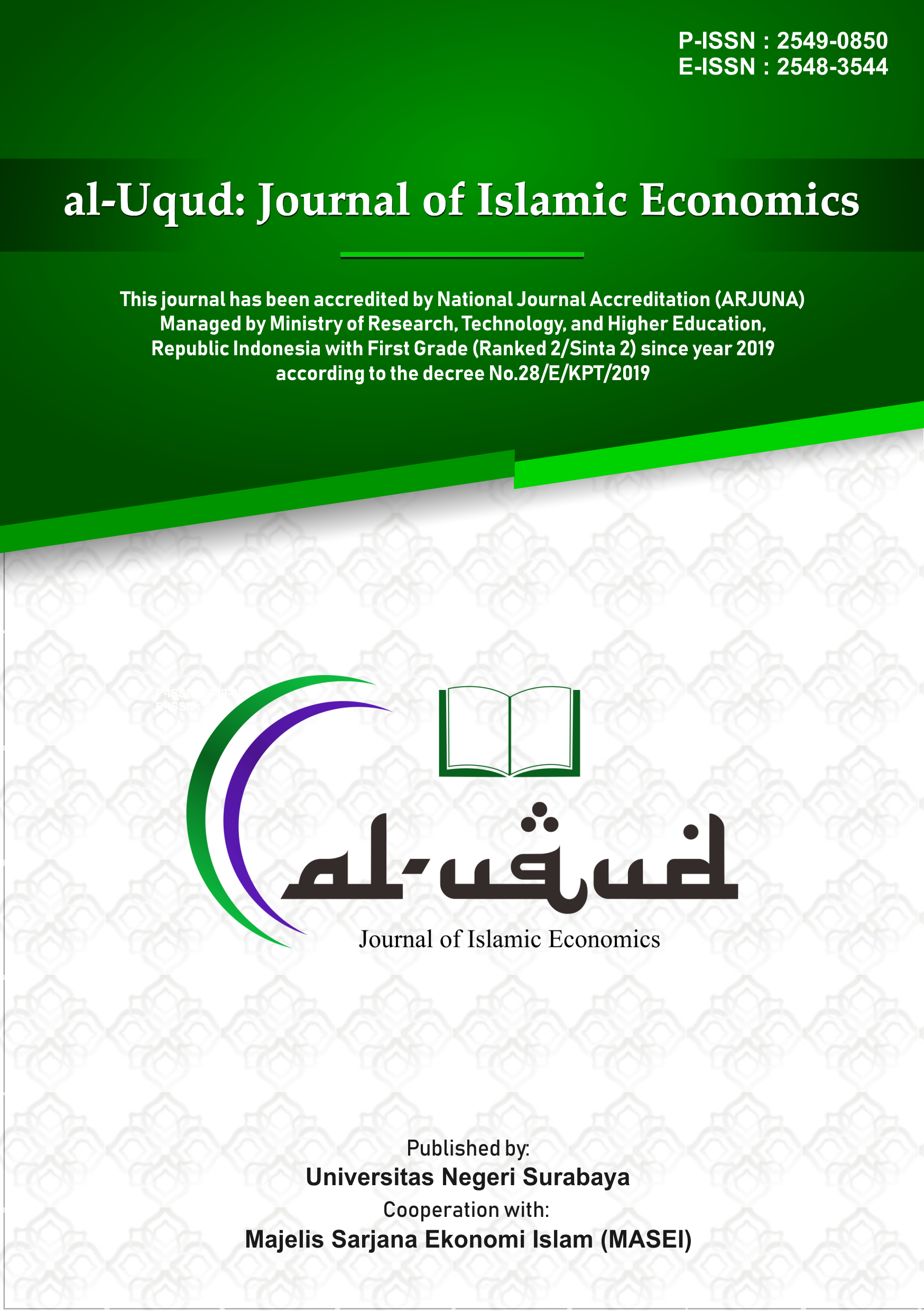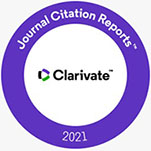The COVID-19 pandemic and the intention of cash waqf: Approach to theory of reason action, level of religiosity and trust in institutions
DOI:
https://doi.org/10.26740/aluqud.v7n1.p138-153Keywords:
Intention to waqf money, Subjective norms, Level of religiosity, Trust , AttitudeAbstract
This study aims to see the intention of cash waqf in the Muslim community in Bandung Raya during the Covid-19 Pandemic and to see how the influence of Theory of Reasoned Action (TRA), namely subjective attitudes and norms with an additional level of religiosity and trust in institutions. The method used in this study is a quantitative approach with a causal descriptive design. The analytical tool used is Partial Least Square-Structural Equation Modeling (PLS-SEM) with the SmartPLS v application. 3.2.9. The subject of this study is the Muslim community in Bandung Raya with a total sample of 210 respondents. The results showed that attitudes, subjective norms, levels of religiosity and trust in institutions were in the high category. There are four variables that have a significant positive effect on the intention of the Muslim community in Bandung Raya to donate money during the Covid-19 pandemic, namely attitudes, subjective norms, level of religiosity and trust in institutions. The results of this study also confirm that attitudes, subjective norms, religiosity and trust are very important in Encouraging the intention to donate during the Covid-19 pandemic.
References
Adirestuty,F., Juliana, J., Ilmy,R. M., & Masrizal, M. (2021). Determinant Factor of Cash Waqf Intentions among Indonesian Society. The Proceeding of the International Conference on Islamic Ecomomics and Finance (ICIEF). 291-307
Ahn, J.-c., Sura, S. & An, J.-C. (2018), Intention to donate via social network sites (SNSs): A comparison study between Malaysian and South Korean users, Information Technology & People, 31 (4), 910-926. https://doi.org/10.1108/ITP-12-2015-0307
Aji, H.M., Albari, A., Muthohar, M., Sumadi, S., Sigit, M., Muslichah, I. & Hidayat, A. (2020), Investigating the determinants of online infaq intention during the COVID-19 pandemic: an insight from Indonesia, Journal of Islamic Accounting and Business Research, 12 (1), 1-20. https://doi.org/10.1108/JIABR-05-2020-0136
Ajzen, I. (2012). The Theory of Planned Behaviour, In P. A. M. Lange, A. W. Kruglanski, & E. T. Higgins (Eds.), Handbook of Theories of Social Psychology (pp. 438-459). Sage.
https://doi.org/10.4135/9781446249215.n22
Ajzen, I. (2005). Attitude, personality and behavior: second edition. USA: Berkshire: Open University Press and McGraw-Hill.
Alamsyah, I., & Juliana, J. (2021). Transition to A True Currency: Impact of COVID-19 on The World Currency System. Islamic Research, 4(2), 42-47.
Alam, S. S., Janor, H., Zanariah, Wel, C. A., & Ahsan, M. N. (2012). Is Religiosity an Important Factor in Influencing the Intention to. World Applied Sciences Journal 19 (7), 1030-1041.
Ali, M., Raza, S.A. & Puah, C.-H. (2017). Factors affecting to select Islamic credit cards in Pakistan: the TRA model, Journal of Islamic Marketing, 8(3), 330-344. https://doi.org/10.1108/JIMA-06-2015-0043
Al Jaffri Saad, R. & Haniffa, R. (2014). Determinants of zakah (Islamic tax) compliance behavior, Journal of Islamic Accounting and Business Research, 5(2), 182-193. https://doi.org/10.1108/JIABR-10-2012-0068
Badan Wakaf Indonesia. (2020). Laporan Hasil Survey Indeks Lierasi Wakaf 2020. Jakarta: Badan Wakaf Indonesia.
Bahari, M. K., Khairi, K. F., & Noor, M. N. (2019). Applying The Theory of Reasoned Action In Establishing Waqf Hypermarket: A Conceptual Framework. E-Proceeding of the International Conference on Economic, Entrepreneurship and Management, 025-018.
Bappeda. (2011, Mei 12). UU No.26 Tahun. 2008. Retrieved from bappeda jabar: http://bappeda.jabarprov.go.id/
Bidin, Z., & Shamsudin, F. M. (2013). Using Theory of Reasoned Action to Explain Taxpayer Intention to. Middle-East Journal of Scientific Research 17(3), 387-394.
BPS. (2020). Jumlah Penduduk Beragama Muslim di Jawa Barat. Bandung: Badan Pusat Statistik.
BPS. (2020). Jumlah Penduduk Menurut Kab/Kota (Jiwa) 2018-2020. Bandung: Badan Pusat Statistik.
Chen, Y., Dai, R., Yao, J. & Li, Y. (2019), Donate time or money?, Sustainability, 11(16), 1-21. https://doi.org/10.3390/su11164269
CNN Indonesia. (2020, Juni 22). Daya Beli Masyarakat Lenyap Rp362 Triliun Gara-gara Corona. Retrieved from CNN Indonesia.com:https://www.cnnindonesia.com/ekonomi/20200622144249-532-516062/daya-beli-masyarakat-lenyap-rp362-triliun-gara-gara-corona
Fauziah, Taib, Ramayah, T. & Abdul Razak, D. (2008). Factors influencing intention to use diminishing partnership home financing, International Journal of Islamic and Middle Eastern Finance and Management, 1(3), 235-248. https://doi.org/10.1108/17538390810901168
Fawwaz, M. F., Juliana, J., Cakhyaneu, A., Muhammad, M., & Marlina, R. (2021). Waqf as Alternative Financing Resource for Infrastructure Development in Indonesia: Analytical Hierarchy Process Approach. Islamic Research, 3(2), 50-58.
Ferrinadewi, E. (2008). Merek dan Psikologi Konsumen. Yogyakarta: Graha Ilmu.
Hair Jr, J. H. (2016). A Primer on Partial Least Squares Structural Equation Modeling (PLS-SEM).
Hair, J. F., Jr. William C. Black, B. J., & Anderson, R. E. (2014). Multivariate Data Analysis Seventh Edition. London: Pearson Education Limited.
Hasbullah, N. A., Khairi, K. F., & Ab. Aziz, M. R. (2015). The Theory of Planned Behaviour and The Impact of Moral Norm. Studies in Social Sciences and Humanities, 3(2), 61-70.
Hasbullah, N. A., Khairi, K. F., & Ab. Aziz, M. R. (2016). Intention To Contribute in Corporate Waqf: Applying The Theory Of Planned Behaviour. Umran - International Journal of Islamic and Civilizational Studies, 3(1), 39-48. https://doi.org/10.11113/umran2016.3n1.39
Hawkins, D. I. (2010). Consumer Behavior: Building Marketing Strategy 11th Edition,. New York: McGraw-Hill Irwin.
Heikal, M., Khaddafi, M., & Falahuddin. (2014). The Intention to Pay Zakat Commercial: An Application of Revised Theory of Planned Behavior. Journal of Economics and Behavioral Studies, 6(9), 727-734.
Ismail, W. (2009). Analisis Komparatif Perbedaan Tingkat religiusitas siswa di lembaga Pendidikan Pesantren, MAN, SMUN. Lentera Pendidikan, 12(1), 87-102
Johari, F. A. (2013). Push and Pull Factors Influencing Waqifs to Contribute Cash Waqf to Waqf Institution in Malaysia. Malaysia: Islamic Philanthropy for Ummah Excellence. Institut Kajian Zakat Malaysia (IKaZ) Universiti Teknologi MARA (UiTM.
Juliana, J., Faathir, M., & Sulthan, M. (2019). Implementasi Etika Bisnis Islam Pelaku Usaha Mikro: Studi Kasus Pada Pelaku Usaha Mikro Syariah Puspa Bank Indonesia Wilayah Jawa Barat di Bandung Tahun 2017. Strategic Jurnal Pendidikan Manajemen Bisnis, 19(1), 36 - 43. https://doi.org/10.17509/strategic.v19i1.17663
Juliana, J., Rahayu, A., & Wardhani, Y. (2020). Muslimpreneur Intentions: Analysis of Family Background. Islamic Research, 3(1), 10-15.
Juliana. (2017). Syariahpreneur dalam Mewujudkan Kesejahteraan Masyarakat. Bandung: Corbooks.
Kashif, M., Sarifuddin, S. & Hassan, A. (2015), Charity donation: intentions and behaviour, Marketing Intelligence and Planning, 33(1), 90-102.
liputan6.com. (2019, 6 12). Indonesia Melesat Jadi Negara Paling Dermawan di Dunia. Retrieved from liputan6.com: https://www.liputan6a.com/health/read/3987796/indonesia-melesat-jadi-negara-paling-dermawan-di-dunia
Marlina, R., Juliana. J., Adila. N., & Robbani, M. (2019). Islamic Political Economy: Critical Review of Economic Policy Indonesia. Journal Review of Islamic Economics and Finance (RIEF), 2(1), 47-55. https://doi.org/10.17509/rief.v2i1.17783
McDaniel, S.W. and Burnett, J.J. (1990) Consumer Religiosity and Retail Store Evaluative Criteria. Journal of the Academy of Marketing Science, 18, 101-112. http://dx.doi.org/10.1007/BF02726426
Nuraini, I., E. T., & Fauzi, A. (2018). Faktor-Faktor Yang Mempengaruhi Intensi Dalam Membayar Wakaf Uang Pada Pegawai Kantor Wilayah Kementerian Agama Provinsi DKI Jakarta. Maro, Jurnal Ekonomi Syariah dan Bisnis, 1(2), 97-108. http://dx.doi.org/10.31949/mr.v1i2.1054
Osman, A. F., & Muhammed, M. O. (2017). Measuring A Cash Waqf Giving Behavior Among Muslim Donors in Malaysia: A Theory of Planned Behavior Approach Using Structural Equation Modeling. JMFIR, 14(2), 39-63.
Osman, A. F., Mohammed, M. O., & Fadzil, A. (2016). Factor Influencing Cash Waqf Giving Behavior : A Revised Theory Planned Behavior. Journal of Global Business and Social Entrepreneurship (GBSE), 1(2), 12-25.
Pitchay, A. A., Meera, A. K., & Saleem, M. Y. (2015). Factors Influencing the Behavioral Intentions of Muslim Employees to Contribute to Cash-Waqf Through Salary Deductions. Through Salary Deductions. JKAU: Islamic Economics, 28(1), 57-90.
Putra, P., & Isfandayani. (2020). Planned Behavior Theory in Paying Cash Waqf. JHSS (Journal of Humanities and Social Studies), 4(1), 5 -9.
Ranganathan, S. K., & Henleyy, W. H. (2008). Determinants of charitable donation intentions: A structural equation model. Journal of Philantropy and Marketing, 13(1), 1-11. https://doi.org/10.1002/nvsm.297
Republika. (2020). Peran Wakaf Belum Optimal Tangani Pandemi Covid 19. Retrieved from Republika: https://republika.co.id/berita/q9stx3327/peran-wakaf-belum-optimal-tangani-pandemi-covid-19
Rizal, H. & Amin, H. (2017), Perceived ihsan, Islamic egalitarianism and Islamic religiosity towards charitable giving of cash waqf, Journal of Islamic Marketing, 8(4), 669-685. https://doi.org/10.1108/JIMA-05-2015-0037
Robbins, Stephen P. & Timothy A. Judge. 2008. Organizational Behavior Edisi 12 Salemba Empat. Jakarta.
Said, S., & Amiruddin, A. M. A. (2019). Wakaf Tunai dan Pemberdayaan Ekonomi Masyarakat. Al-Mashrafiyah: Jurnal Ekonomi, Keuangan, Dan Perbankan Syariah, 3(1), 43-55. https://doi.org/10.24252/al-mashrafiyah.v3i1.7739
Sakti, M. R., Thaker, H., Qoyum, A., & Qizam, I. (2016). Determinants of Cash Waqf Contribution in Klang Valley and Selangor: a SEM Approach. Determinants of Cash. Journal of Islamic Economics and Finance, 2(1), 111-144.
Sargeant, A., & Lee, S. (2004). Donor trust and relationship commitment in the UK harity sector: the impact on behavior. Nonprofit and Voluntary Sector Quarterly, 33(2). https://doi.org/10.1177/0899764004263321
Shukor, S. A., Anwar, I. F., Aziz, S. A., & Sabri, H. (2017). Muslim Attitude Towards Participation in Cash Waqf: Antecedents and Consequences. International Journal of Business and Society, 18(S1), 193-204.
World Bank Group and COVID-19 (coronavirus). (2020, September 15). Retrieved from www.worldbank.org: https://www.worldbank.org/en/who-we-are/news/coronavirus-covid19
Downloads
Published
How to Cite
Issue
Section
License
Copyright (c) 2023 The author(s)

This work is licensed under a Creative Commons Attribution 4.0 International License.
CC BY 4.0 Abstract views: 880
,
Abstract views: 880
, PDF Downloads: 786
PDF Downloads: 786








